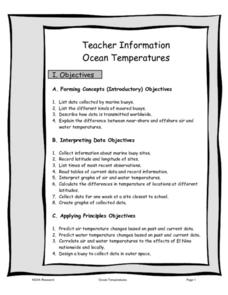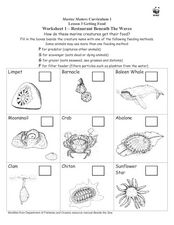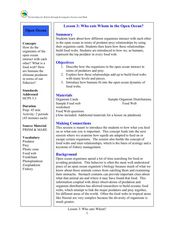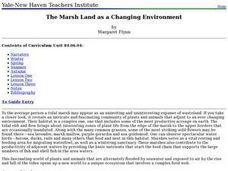Curated OER
Food Webs
Students recognize interdependence in a food web by using yarn and notecards to create a food web and discussing what would happen if one of the organisms from a certain trophic level is removed.
Curated OER
Clean Water vs. Dirty Water
Students study the importance of clean water to the survival of organisms and what activiities and material pollute water. They measure the temperature of water samples and create a class graph.
Curated OER
Hypoxia and the Dead Zone in the Gulf of Mexico
Students investigate the causes of hypoxia, the characteristics of a watershed, and how the actions and management practices of people can both negatively and positively affect aquatic ecosystems.
Curated OER
Failing Ecosystems: Haiti and the Caribbean
Ninth graders study the impact that climate has on the land. They discuss how deforestation leads to erosion and soil damage and how trees and vegetation help to stabilize the land. They draw a large map of the Caribbean and show Haiti...
Curated OER
Lesson 9 - Along Our Coast
Students study the benefits of estuaries. They construct a saltwater food web, and complete worksheets and a quiz.
Curated OER
BATS: NEED NECTAR, WILL TRAVEL
Students play the role of nectar feeding bats on their annual migration
and try to avoid the different hazards that hinder their progress. They describe the annual migration of long-nosed bats including key elements such as: where the...
Curated OER
What Was for Dinner?
Students examine energy obtaining strategies that are used by organisms in deep reef communities. In this ocean activity students complete an isotope activity.
Curated OER
High School Marine Science at its Best: Research Collaboration
Students formulate a more accurate understanding of the true nature of scientific research and the challenges and rewards of field investigations.
Curated OER
Exploring Deep Ocean Habitats: Alien Invasion
Young scholars compare and contrast "alien species" and "invasive species."Students explain positive and negative impacts associated with introduction of non-native species, and give a specific example of species that produce t
Curated OER
Breaking Away (Or Not...)
Students compare and contrast common reproductive strategies used by benthic invertebrates. They describe the most common reproductive strategies among benthic invertebrates on a seamount, and explain why these strategi
Curated OER
Great Barrier Reef
Ninth graders read text imbedded in this plan and find the answers to 3 questions: Why is the Great Barrier Reef one of the natural wonders of the world? What value does the reef offer Australia's economy? How is the reef being damaged?
Curated OER
The Sights and Sounds of Orcas
Students investigate the orca whale. They participate in an online Webquest, listen to whale vocalizations online, answer discussion questions, and locate and read newspaper articles on marine mammals and orca whales.
Curated OER
Life on the Edge: Exploring Deep Ocean Habitats Cool Corals
Students research the basic morphology of Lophelia corals and polyps to determine the significance of these organisms. They detail the reasons that biological communities are focusing on the Lophelia corals as major conservation efforts.
Curated OER
Ocean Temperatures
Learners list data collected by marine buoys and the different kinds of moored buoys. They describe how data is transmitted worldwide. They explain the difference between near shore and offshore air and water temperatures.
Curated OER
Whale of a Tale
Students apply problem solving techniques to answer a question. After reading a passage, they compare and contrast three species of whale in a quantitative fashion.
Curated OER
Connecting to the Poles through TEA E-Mail
Learners explore the integral role of the remote polar regions within the global system. They answer the question: How will change in the ice sheets impact global sea level and climate? Students comprehend that the poles offer unique...
Curated OER
Restaurant Beneath the Waves
In this marine life worksheet, students fill in the boxes beside each ocean creature name with one of the following feeding methods: predator, scavenger, grazer, and filter feeder. Students then list or draw marine creatures that use the...
Curated OER
Great Barrier Reef-Guarding Nemo
Learners explore the Great Barrier Reef. In this environmental stewardship instructional activity, students conduct research regarding the Great Barrier Reef and examine methods to preserve the Reef. Learners apply the RAFT method to...
Curated OER
So, What's it Doing Today?
Students describe short-term variations in oceanographic parameters in the Gulf Stream. In this ocean habitats lesson students use satellite imagery to obtain information in the Gulf Stream.
Curated OER
Who Eats Whom in the Open Ocean?
Students examine how organisms interact with one another in the ocean. For this science lesson, students discuss predators and prey in the ocean. Students discuss food webs and how organisms interact with each other.
Curated OER
Impacts to the Open Ocean
Students investigate how human beings impact ocean ecosystems. In this ocean ecosystem lesson, students explore how marine debris affects marine life. Internet resources are provided.
Curated OER
Hazardous Chemicals in Your Neighborhood
Students examine the effect of hazardous chemicals on humans. They discover how the chemicals are cleaned up and the facilities in their neighborhood. They identify federal and local agencies that oversee environmental hazards
Curated OER
The Marsh Land as a Changing Environment
Sixth graders continue their examination of the state of Connecticut. After taking a field trip, they identify the types of birds, plants, invertebrates and vertebrates who make their home in the salt marshes. In groups, they identify...
Curated OER
Land Use Decision
Students identify social and ecological considerations where human uses of land and trees conflict with each other and ecosystem needs, and describe importance of land-use management and planning through role play.

























